性格对人的影响 How Character Influences People(大学英语作文)
性格的影响 英语作文
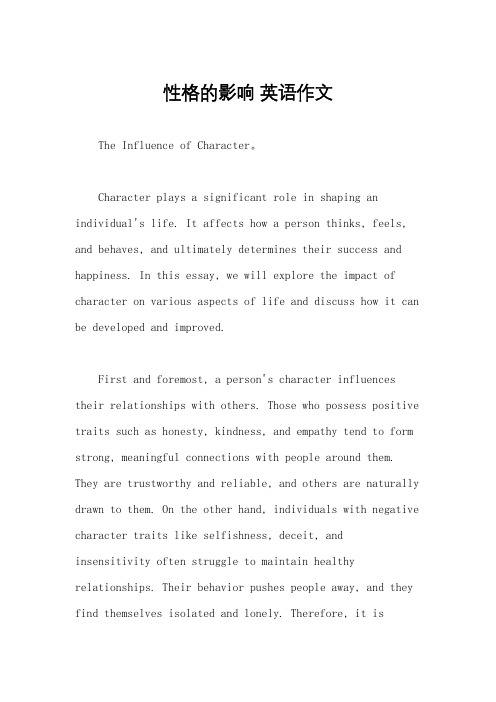
性格的影响英语作文The Influence of Character。
Character plays a significant role in shaping an individual's life. It affects how a person thinks, feels, and behaves, and ultimately determines their success and happiness. In this essay, we will explore the impact of character on various aspects of life and discuss how it can be developed and improved.First and foremost, a person's character influences their relationships with others. Those who possess positive traits such as honesty, kindness, and empathy tend to form strong, meaningful connections with people around them. They are trustworthy and reliable, and others are naturally drawn to them. On the other hand, individuals with negative character traits like selfishness, deceit, andinsensitivity often struggle to maintain healthy relationships. Their behavior pushes people away, and they find themselves isolated and lonely. Therefore, it isevident that one's character has a direct impact on their social life and the quality of their relationships.Furthermore, character affects a person's ability to achieve their goals and succeed in life. Those who are determined, disciplined, and hardworking are more likely to persevere through challenges and setbacks. They have the resilience to overcome obstacles and stay focused on their objectives. Conversely, individuals with a weak character may lack the motivation and perseverance needed to pursue their ambitions. They may give up easily or succumb to distractions, hindering their progress and limiting their potential. As a result, it is clear that character plays a crucial role in determining one's level of success and achievement.In addition, character influences how a person handles adversity and difficult situations. Those with a positive character are able to remain calm and composed in the face of adversity. They are resilient and resourceful, and they can find solutions to their problems. On the other hand, individuals with a negative character may becomeoverwhelmed and succumb to stress and anxiety when confronted with challenges. They may react impulsively or irresponsibly, making their situations worse. Therefore, it is evident that one's character has a significant impact on their ability to cope with adversity and navigate through tough times.It is important to note that character is not fixed or predetermined. It can be developed and improved over time through conscious effort and self-reflection. Bycultivating positive traits such as integrity, compassion, and perseverance, individuals can enhance their character and become better versions of themselves. This can be achieved through various means, such as seeking feedback from others, practicing self-discipline, and engaging in activities that promote personal growth and self-awareness.In conclusion, character has a profound influence on various aspects of life, including relationships, success, and resilience. It is a defining factor in shaping an individual's identity and determining their overall well-being. By recognizing the impact of character and activelyworking to improve it, individuals can lead more fulfilling and meaningful lives.。
性格决定你的为人处世

性格决定你的为人处世性格决定你的为人处世有很多年轻人,在学校的时候骄傲,不谦虚,以为成绩优秀就各方面都优秀,自以为是。
殊不知,进入社会后的竞争是多方面的,山外有山,人外有人。
工作后也不懂得尊重前辈,遇到问题也不懂得向前辈请教。
还有很多年轻人,毕业以后认为学习就结束了,到工作岗位以后,这也干不了,那也干不成,用不了多久不是自己辞职,就是被企业开除了。
当你来到社会这个大家庭的时候,你要靠自己的能力,靠自己的聪明才智去获取应有的报酬,去得到社会的认可,你已经不是小孩子了,不要用其他方法来乞求得到别人的同情和帮助。
性格决定你的为人处世关于成功,微软中国名誉总裁、前盛大网络公司总裁、现新华都集团总裁兼CEO唐骏总结出了一个"4+1定律"。
"4"即指知识、机遇、勤奋、激情;"1"就是良好的性格。
唐骏认为好的性格是成功者身上必备的重要元素之一。
性格决定着一个人事业的成败和命运。
性格对一个人的生活和为人处世有很大的影响。
性格表现一个人对现实和周围世界的态度,并表现在他的行为举止中,体现在对自己、对他人、对事物的态度和所采取的言行上。
有些人性格火暴,为一点小事就能大发雷霆;有些人性格温柔,做起事来慢条斯理;有些人性格刚毅,工作起来就大刀阔斧;有些人性格孤僻,不愿与人亲近。
性格决定一个人的思维方式,思维方式决定一个人的处世方法。
许多成功人士和商业巨子的成功,在很大程度上都归功于他们受人欢迎的性格。
如果不是性格,仅仅靠他们的聪明才智、毅力和实践经验的话,那么成功是很困难的。
只要我们细心观察,他们很多人都有这样一些性格特征:谦虚、乐观、坚定、富有亲和力等等。
瑞士心理学家荣格,把人的性格分为内倾型和外倾型。
内倾型的特点是处世谨慎、深思熟虑、交际面窄、适应环境能力差,外倾型的特点是活泼开朗、活动能力强、容易适应环境的变化。
性格外向的人善于与人交往,他们在工作中把自己的长处发挥得淋漓尽致,受到同事们的青睐,不少性格内向的人也希望能成为人群中令人瞩目的"明星",但由于他们不善于表达,很难让周围的人了解自己,甚至因为性格内向而没有社交。
性格的影响英语作文
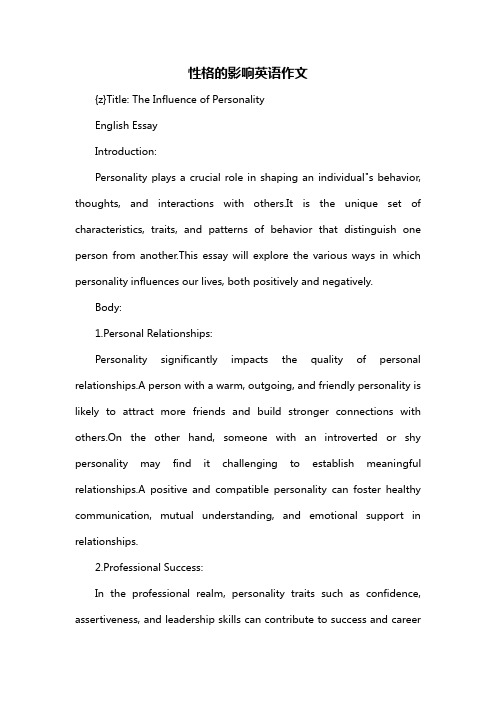
性格的影响英语作文{z}Title: The Influence of PersonalityEnglish EssayIntroduction:Personality plays a crucial role in shaping an individual"s behavior, thoughts, and interactions with others.It is the unique set of characteristics, traits, and patterns of behavior that distinguish one person from another.This essay will explore the various ways in which personality influences our lives, both positively and negatively.Body:1.Personal Relationships:Personality significantly impacts the quality of personal relationships.A person with a warm, outgoing, and friendly personality is likely to attract more friends and build stronger connections with others.On the other hand, someone with an introverted or shy personality may find it challenging to establish meaningful relationships.A positive and compatible personality can foster healthy communication, mutual understanding, and emotional support in relationships.2.Professional Success:In the professional realm, personality traits such as confidence, assertiveness, and leadership skills can contribute to success and careergrowth.A person with a dynamic and charismatic personality may excel in roles that require public speaking, team management, or client interaction.Conversely, individuals with a more reserved or timid personality may struggle in such positions.However, possessing qualities like empathy, patience, and strong work ethic can also lead to success in various career paths.3.Mental and Physical Health:Personality traits can have a profound impact on an individual"s mental and physical well-being.For example, a positive and optimistic personality may help in coping with stress, adversity, and health challenges.Such individuals are more likely to maintain good mental health and have a strong immune system.Conversely, a negative or pessimistic personality can lead to increased stress levels, anxiety, and even impact physical health.It is essential to cultivate a balanced and resilient personality to promote overall well-being.4.Problem-Solving and Decision-Making:Different personality traits can influence an individual"s approach to problem-solving and decision-making.A calm and analytical personality may enable a person to make rational decisions and solve complex problems effectively.On the other hand, a personality that is impulsive or prone to emotional reactions may lead to hasty decisions and poor problem-solving strategies.Developing a well-rounded personality thatcombines logical thinking and emotional intelligence can enhance one"s ability to navigate challenges and make informed decisions.Conclusion:In conclusion, personality plays a multifaceted role in various aspects of our lives.It influences personal relationships, professional success, mental and physical health, as well as problem-solving abilities.While certain personality traits may provide advantages in specific areas, it is crucial to cultivate a well-rounded and balanced personality to lead a fulfilling life.Embracing self-awareness, personal growth, and continuous improvement can help individuals maximize the positive impact of their personality and mitigate any potential drawbacks.。
人格影响英语作文
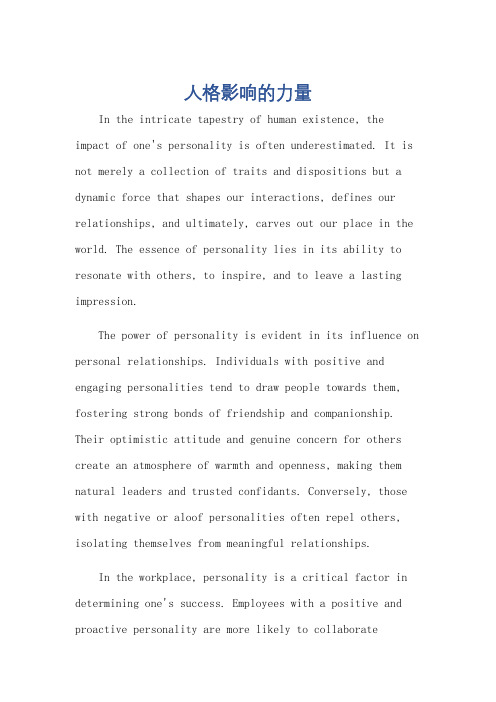
人格影响的力量In the intricate tapestry of human existence, the impact of one's personality is often underestimated. It is not merely a collection of traits and dispositions but a dynamic force that shapes our interactions, defines our relationships, and ultimately, carves out our place in the world. The essence of personality lies in its ability to resonate with others, to inspire, and to leave a lasting impression.The power of personality is evident in its influence on personal relationships. Individuals with positive and engaging personalities tend to draw people towards them, fostering strong bonds of friendship and companionship. Their optimistic attitude and genuine concern for others create an atmosphere of warmth and openness, making them natural leaders and trusted confidants. Conversely, those with negative or aloof personalities often repel others, isolating themselves from meaningful relationships.In the workplace, personality is a critical factor in determining one's success. Employees with a positive and proactive personality are more likely to collaborateeffectively, innovate, and overcome challenges. Their enthusiasm and can-do attitude inspire their colleagues, leading to increased productivity and a more positive work environment. On the other hand, individuals with a passive or negative personality can drag down the morale of the team, hindering progress and innovation.Moreover, personality plays a pivotal role in shaping one's social identity. It is often the first thing that people notice about us, and it greatly influences how we are perceived by others. A confident and outgoing personality can help us make a favorable impression, opening doors to new opportunities and experiences. Conversely, a reserved or insecure personality can limit our social circles and prevent us from fully realizing our potential.The influence of personality is not limited to personal and professional realms; it extends to our impact on society as well. Individuals with strong moral character and a sense of integrity often serve as beacons of hope and inspiration, leading by example and inspiring others to follow suit. Their actions and decisions align with theirprinciples, earning them the respect and admiration ofthose around them.However, it's important to recognize that personalityis not static; it evolves and adapts over time. While some aspects of our personality may be inherent, we can always work towards improving and refining it. By cultivating positive habits, engaging in meaningful activities, and seeking feedback from others, we can gradually shape our personality into one that is more resilient, empathetic,and influential.In conclusion, the impact of personality is profoundand multifaceted. It shapes our relationships, determines our success, defines our social identity, and influencesour impact on society. By understanding and harnessing the power of our personality, we can create positive change in our lives and in the lives of others.**人格影响的力量**在纷繁复杂的人类生活画卷中,个人性格的影响力常常被低估。
影响人们个性的因素英语作文
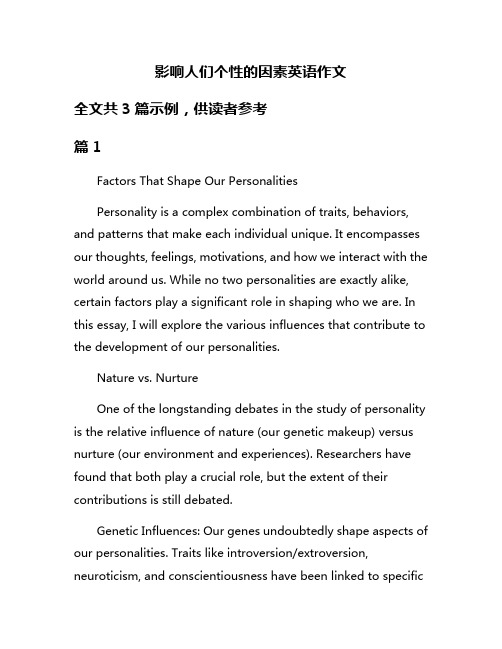
影响人们个性的因素英语作文全文共3篇示例,供读者参考篇1Factors That Shape Our PersonalitiesPersonality is a complex combination of traits, behaviors, and patterns that make each individual unique. It encompasses our thoughts, feelings, motivations, and how we interact with the world around us. While no two personalities are exactly alike, certain factors play a significant role in shaping who we are. In this essay, I will explore the various influences that contribute to the development of our personalities.Nature vs. NurtureOne of the longstanding debates in the study of personality is the relative influence of nature (our genetic makeup) versus nurture (our environment and experiences). Researchers have found that both play a crucial role, but the extent of their contributions is still debated.Genetic Influences: Our genes undoubtedly shape aspects of our personalities. Traits like introversion/extroversion, neuroticism, and conscientiousness have been linked to specificgenetic markers. Twin studies have shown that identical twins, who share the same genetic code, tend to have more similar personalities than fraternal twins, even when raised in different environments.Environmental Influences: While our genes provide a foundation, our experiences and surroundings also profoundly impact our personalities. The way we are raised, the relationships we form, and the challenges we face all contribute to shaping who we become. Children who grow up in nurturing, supportive environments tend to develop more positive personality traits, while those exposed to trauma or neglect may struggle with anxiety, low self-esteem, or aggression.The interplay between nature and nurture is complex, and most experts agree that both play a significant role in personality development.Family and Early Childhood ExperiencesOur family environment and early childhood experiences are among the most influential factors in shaping our personalities. From birth, we absorb the values, beliefs, and behaviors of our primary caregivers, which can profoundly impact our worldview and how we perceive ourselves and others.Parenting Styles: Research has shown that different parenting styles can lead to distinct personality traits in children. Authoritative parenting, which strikes a balance between warmth, support, and reasonable discipline, is associated with higher self-esteem, better social skills, and stronger academic performance in children. Conversely, authoritarian or permissive parenting styles can contribute to more negative personality traits, such as aggression, low self-control, or a lack of motivation.Birth Order: Birth order has also been linked to personality differences among siblings. Firstborns tend to be more conscientious, responsible, and achievement-oriented, while later-born children may be more rebellious, attention-seeking, and sociable.Attachment and Relationships: The quality of our earliest relationships, particularly with primary caregivers, can have a lasting impact on our personalities. Children who form secure attachments with their parents are more likely to develop positive traits like trust, empathy, and emotional regulation. Conversely, insecure or disrupted attachments can contribute to anxiety, low self-esteem, and difficulties forming healthy relationships later in life.Cultural InfluencesThe culture in which we are raised also plays a significant role in shaping our personalities. Cultural norms, values, and expectations shape our beliefs, attitudes, and behaviors from an early age.Individualistic vs. Collectivistic Cultures: In individualistic cultures, such as those found in Western countries, personal achievement, independence, and self-expression are highly valued. These cultural values often contribute to more assertive, competitive, and individualistic personality traits. In contrast, collectivistic cultures, common in many Asian and Latin American societies, emphasize group harmony, loyalty, and interdependence. These values can foster more cooperative, modest, and socially oriented personality traits.Gender Roles and Expectations: Cultural gender roles and expectations also influence personality development. In societies with more traditional gender norms, individuals may be encouraged to adopt personality traits that align with these expectations, such as assertiveness and competitiveness for men, and nurturing and empathy for women.Religion and Spirituality: Religious and spiritual beliefs can also shape personality traits. For example, religions thatemphasize humility, compassion, and selflessness may contribute to the development of personality traits like agreeableness and conscientiousness.Life Experiences and Significant EventsOur personalities are not static; they continue to evolve and change throughout our lives in response to significant experiences and events.Trauma and Adversity: Traumatic events, such as abuse, natural disasters, or the loss of a loved one, can profoundly impact our personalities. Individuals who have experienced trauma may develop personality traits like anxiety, depression, or post-traumatic stress disorder (PTSD). However, some individuals also exhibit resilience and personal growth in the face of adversity.Major Life Transitions: Significant life transitions, such as starting a new job, getting married, or becoming a parent, can also shape our personalities. These experiences may require us to develop new skills, adapt to new roles, and adjust our priorities, leading to changes in our personality traits.Educational and Career Experiences: Our educational and career experiences also contribute to our personalitydevelopment. The skills and knowledge we acquire, the challenges we face, and the environments we work in can all influence our personality traits, such as conscientiousness, openness to experience, and emotional stability.Peer Influences and Social EnvironmentsThe social environments we inhabit and the people we interact with also play a crucial role in shaping our personalities.Peer Groups: During adolescence and early adulthood, peer groups can have a significant influence on personality development. Individuals may adopt attitudes, behaviors, and personality traits that align with their peer group's norms and values, either to fit in or as a form of rebellion.Social Roles and Expectations: The social roles we occupy and the expectations placed upon us by society can also shape our personalities. For example, individuals in leadership positions may develop more assertive, confident, and decisive personality traits, while those in caregiving roles may cultivate traits like empathy, nurturing, and patience.Media and Popular Culture: In today's media-saturated world, popular culture and mass media also contribute to the formation of personality traits. Exposure to certain mediamessages and depictions of personality types can influence individuals, particularly young people, to adopt or reject certain personality traits.ConclusionIn summary, our personalities are shaped by a complex interplay of various factors, including our genetic makeup, family environment, cultural influences, life experiences, and social environments. While some aspects of our personalities may be relatively stable over time, others continue to evolve and adapt in response to the challenges and opportunities we encounter throughout our lives. Understanding these influences can help us better appreciate the diversity of human personality and the unique journeys that shape each individual's character.篇2Factors that Influence PersonalityEach person is a unique individual, molded by the interplay of diverse forces that shape their personality over time. Personality is a complex tapestry woven from the threads of our genes, our upbringing, our life experiences, and the social and cultural environments in which we are immersed. In this essay, Iwill explore the multifaceted factors that contribute to the development of our distinctive personalities.Nature vs. Nurture: The Age-Old DebateThe nature versus nurture debate has been a longstanding discourse in the field of psychology, attempting to unravel the relative contributions of genetics and environmental influences on personality. While it is widely accepted that both play a role, the extent to which each factor shapes our personalities remains a topic of ongoing research and discussion.Genetic InfluencesOur genes serve as the blueprint for our physical and psychological traits, including personality characteristics. Twin studies have provided compelling evidence that certain personality dimensions, such as introversion or extroversion, have a genetic component. However, it is important to note that genes do not determine our personalities in a deterministic fashion; rather, they interact with environmental factors in complex ways.Temperament and Early ExperiencesFrom the moment we are born, our temperament – the innate and biologically-based tendencies that shape ouremotional reactivity, attention, and behavior – begins to shape our personality. An infant's temperament, whether easy-going or fussy, can influence the way caregivers respond to them, which in turn can shape the child's developing personality.Moreover, the quality of our early experiences, particularly the attachment bonds we form with our primary caregivers, can have a profound impact on our personality development. Secure attachments foster traits like trust, resilience, and emotional regulation, while insecure attachments can contribute to anxiety, low self-esteem, and difficulties in forming healthy relationships.Parenting Styles and Family DynamicsThe parenting styles we experience can significantly influence our personality development. Authoritative parenting, which strikes a balance between warmth and firm boundaries, is often associated with the development of self-confidence,self-control, and social competence. In contrast, authoritarian or permissive parenting styles can contribute to traits such as aggression, low self-esteem, or impulsivity.Family dynamics, including the relationships between siblings, the presence or absence of role models, and the overall family environment, can also shape our personalities. Positive family experiences can foster traits like empathy, cooperation,and emotional intelligence, while negative experiences, such as abuse or neglect, can contribute to maladaptive personality traits.Social and Cultural InfluencesPersonality development does not occur in a vacuum; it is profoundly influenced by the social and cultural contexts in which we are embedded. The values, norms, and expectations of our sociocultural environments can shape our beliefs, attitudes, and behaviors, which in turn contribute to the formation of our personalities.Peer groups, particularly during adolescence, can exert a powerful influence on personality development. Individuals may adopt certain personality traits or behaviors to conform to the norms of their peer groups or to establish their social identities.Cultural values and belief systems also play a significant role in shaping personality. For instance, cultures that emphasize individualism may foster traits like independence and assertiveness, while collectivistic cultures may emphasize traits such as interdependence and conformity.Life Experiences and Personal NarrativesOur life experiences, both positive and negative, can profoundly shape our personalities. Traumatic events, such as abuse, accidents, or natural disasters, can contribute to the development of personality disorders or maladaptive coping mechanisms. Conversely, positive experiences, such as achieving personal goals or overcoming challenges, can foster resilience, self-efficacy, and personal growth.Moreover, the way we interpret and construct personal narratives around our experiences can influence our personalities. Our self-narratives shape our self-concept, beliefs, and emotional responses, which in turn shape our behavior and interactions with others.The Role of Education and LearningEducation and learning experiences can also play a significant role in personality development. Formal education can expose individuals to diverse perspectives, knowledge, and ways of thinking, which can broaden their worldviews and shape their personalities.Informal learning experiences, such as travel, hobbies, or personal projects, can also contribute to personality development by fostering new skills, interests, and perspectives.Personality Stability and ChangeWhile personality traits tend to exhibit relative stability over time, particularly after emerging adulthood, our personalities are not set in stone. Significant life events, major transitions, or conscious efforts at personal growth can lead to personality changes throughout our lifetimes.The concept of personality plasticity suggests that our personalities can adapt and evolve in response to changing circumstances, new experiences, and personal development efforts. This highlights the dynamic and flexible nature of personality, which continues to be shaped by the interplay of various factors over the course of our lives.ConclusionIn conclusion, personality development is a complex and multifaceted process influenced by a myriad of factors, including genetics, temperament, early experiences, parenting styles, social and cultural influences, life experiences, education, and personal narratives. Understanding these diverse influences can provide insights into the unique tapestry that comprises each individual's personality.Recognizing the interplay of these factors can also help us appreciate the diversity of human personalities and foster greater understanding, empathy, and acceptance of individual differences. Ultimately, embracing the richness of human personality is a testament to the complexity and wonder of the human experience.篇3Factors that Influence Our PersonalitiesWe are all unique individuals, shaped by the experiences and circumstances that make up our lives. While our genetic makeup lays the foundation for our personalities, there are numerous external factors that also play a significant role in molding who we are. In this essay, I will explore some of the key influences that contribute to the development of our personalities.Nature vs. NurtureOne of the longstanding debates in psychology revolves around the relative importance of nature (our genetic inheritance) and nurture (our environment and experiences) in shaping our personalities. While it is widely accepted that both play a role, the extent to which each factor contributes is still a subject of ongoing research and discussion.Genetics undoubtedly play a crucial part in determining our basic temperament and tendencies. Traits such as introversion or extroversion, emotional stability, and even risk-taking behavior have been linked to specific genetic variations. However, it is important to note that these genetic predispositions do not determine our personalities in a rigid or deterministic way. They merely provide a starting point, a canvas upon which our experiences and environment can paint the intricate details of our individual personalities.Family EnvironmentOne of the most significant nurturing influences on our personalities is our family environment. From the moment we are born, we are exposed to the values, beliefs, and behaviors of our parents and immediate family members. The way we are raised, the emotional support (or lack thereof) we receive, and the dynamics within our family unit all contribute to shaping our personalities.Children raised in loving, supportive environments tend to develop a sense of security, confidence, and positive self-esteem. Conversely, those who grow up in dysfunctional or abusive households may struggle with issues such as low self-worth, trust issues, and emotional instability. The relationships we have withour siblings and the roles we play within the family can also have a lasting impact on our personalities.Cultural and Social InfluencesBeyond our immediate family, the cultural and social environments in which we are raised also play a significant role in shaping our personalities. Cultural norms, values, and beliefs can influence our attitudes, behaviors, and perspectives on various aspects of life.For example, individuals raised in cultures that emphasize collectivism may be more likely to develop personalities that prioritize group harmony and interdependence. In contrast, those raised in more individualistic societies may tend to value personal autonomy and self-expression to a greater degree.Social influences, such as our peer groups, educational experiences, and the media we consume, can also shape our personalities. The people we associate with, the values they hold, and the behaviors they model can subtly (or sometimes overtly) influence our own beliefs, attitudes, and ways of interacting with the world.Life Experiences and Pivotal EventsThroughout our lives, we encounter a myriad of experiences, both positive and negative, that can profoundly impact our personalities. Significant life events, such as trauma, loss, or major achievements, can trigger shifts in our perspectives, coping mechanisms, and overall worldviews.For instance, individuals who have experienced traumatic events may develop traits such as heightened vigilance, anxiety, or emotional guardedness as a coping mechanism. On the other hand, those who have overcome significant challenges or achieved remarkable successes may develop greater resilience, confidence, and a sense of self-efficacy.Personal Choices and Self-ReflectionWhile many factors that shape our personalities are external, it is important to recognize the role of personal agency and self-reflection. As we mature and gain self-awareness, we have the ability to consciously examine our beliefs, behaviors, and patterns of thought, and make intentional choices to shape our personalities in ways that align with our values and goals.Through introspection, therapy, or personal growth practices, we can identify and work on aspects of our personalities that we wish to change or enhance. This process ofself-discovery and personal growth can lead to profound shifts in our attitudes, emotional regulation, and overall sense of self.ConclusionIn conclusion, our personalities are shaped by a complex interplay of nature and nurture, encompassing our genetic predispositions, family environments, cultural and social influences, life experiences, and personal choices. While some factors may have a stronger influence than others, it is the unique combination of these elements that makes each of us a distinct and multifaceted individual.By understanding the various factors that contribute to personality development, we can gain greater self-awareness and potentially make conscious choices to cultivate the aspects of our personalities that we value most. Ultimately, our personalities are not static or immutable; they are ever-evolving reflections of our journeys through life.。
性格的影响英文作文
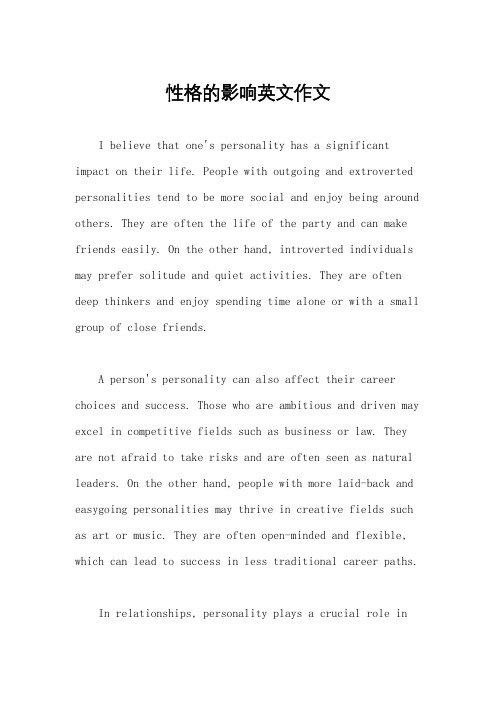
性格的影响英文作文I believe that one's personality has a significant impact on their life. People with outgoing and extroverted personalities tend to be more social and enjoy being around others. They are often the life of the party and can make friends easily. On the other hand, introverted individuals may prefer solitude and quiet activities. They are often deep thinkers and enjoy spending time alone or with a small group of close friends.A person's personality can also affect their career choices and success. Those who are ambitious and driven may excel in competitive fields such as business or law. They are not afraid to take risks and are often seen as natural leaders. On the other hand, people with more laid-back and easygoing personalities may thrive in creative fields such as art or music. They are often open-minded and flexible, which can lead to success in less traditional career paths.In relationships, personality plays a crucial role incompatibility. People with similar personalities may findit easier to understand and relate to each other. They may enjoy similar activities and have compatible communication styles. However, opposites can also attract, and sometimes complementary personalities can create a balanced and harmonious relationship.One's personality can also affect their health andwell-being. For example, people with high levels of stress and anxiety may be more prone to certain health issues. On the other hand, individuals with positive and optimistic personalities may have better overall health and a stronger immune system. Additionally, personality traits such as conscientiousness and self-discipline can lead to healthier habits and lifestyle choices.In conclusion, personality has a profound impact on every aspect of our lives, from our social interactions to our career choices and even our health. Embracing and understanding our own personalities can help us navigate the world and build fulfilling relationships and successful careers.。
性格的影响英文作文初中
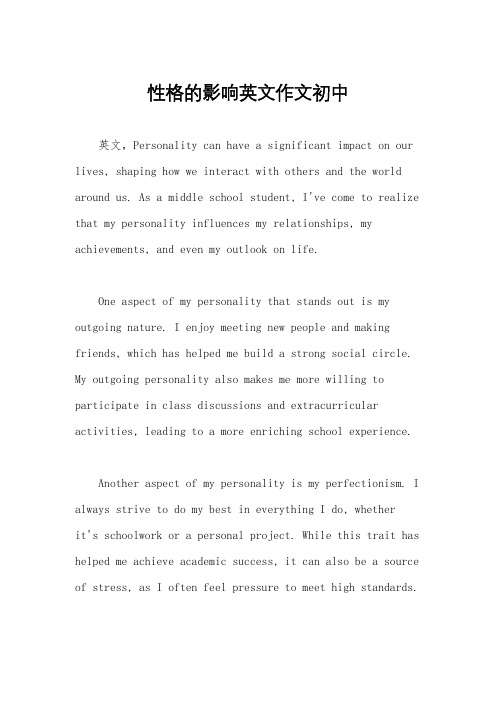
性格的影响英文作文初中英文,Personality can have a significant impact on our lives, shaping how we interact with others and the world around us. As a middle school student, I've come to realize that my personality influences my relationships, my achievements, and even my outlook on life.One aspect of my personality that stands out is my outgoing nature. I enjoy meeting new people and making friends, which has helped me build a strong social circle. My outgoing personality also makes me more willing to participate in class discussions and extracurricular activities, leading to a more enriching school experience.Another aspect of my personality is my perfectionism. I always strive to do my best in everything I do, whetherit's schoolwork or a personal project. While this trait has helped me achieve academic success, it can also be a source of stress, as I often feel pressure to meet high standards.In addition to my outgoing nature and perfectionism, I also consider myself to be empathetic. I try to understand others' perspectives and feelings, which helps me build meaningful relationships with my peers. My empathy also allows me to be a supportive friend, as I'm always willing to lend an ear or offer advice when needed.Overall, I believe that my personality has a profound impact on my life. It shapes how I approach challenges, how I interact with others, and how I navigate the world around me. While my personality traits have both positive and negative aspects, I believe that they ultimately contribute to making me who I am.中文,性格对我们的生活有着重要的影响,塑造了我们与他人和周围世界互动的方式。
性格的影响英文作文初中
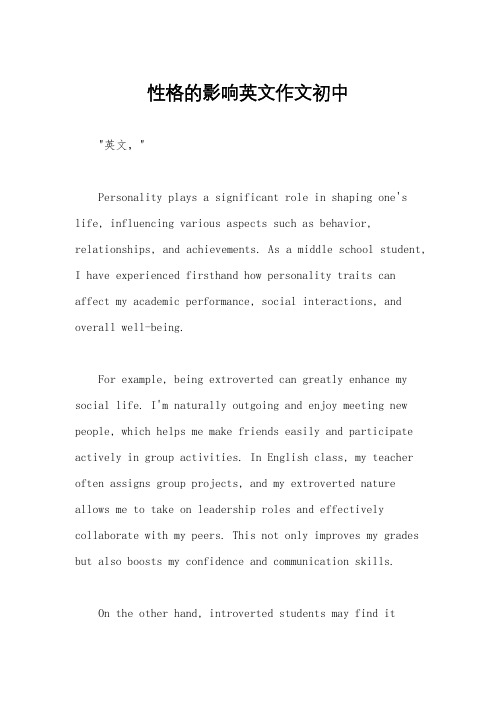
性格的影响英文作文初中"英文,"Personality plays a significant role in shaping one's life, influencing various aspects such as behavior, relationships, and achievements. As a middle school student, I have experienced firsthand how personality traits can affect my academic performance, social interactions, and overall well-being.For example, being extroverted can greatly enhance my social life. I'm naturally outgoing and enjoy meeting new people, which helps me make friends easily and participate actively in group activities. In English class, my teacher often assigns group projects, and my extroverted nature allows me to take on leadership roles and effectively collaborate with my peers. This not only improves my grades but also boosts my confidence and communication skills.On the other hand, introverted students may find itchallenging to engage in social settings. They prefer solitary activities and often feel drained afterinteracting with others for extended periods. I have a friend who is introverted, and although he excels academically, he struggles to participate in class discussions and make friends outside his small circle. However, his introverted nature also makes him a great listener and thinker, and he often comes up with insightful ideas during brainstorming sessions.Furthermore, personality influences how we handle stress and adversity. Someone with a laid-back attitude may take setbacks in stride and remain calm under pressure, while a perfectionist may become overwhelmed and anxious when faced with obstacles. Personally, I tend to be more on the laid-back side, which helps me stay relaxed during exams and project deadlines. However, I've seen classmates who are perfectionists stress themselves out over every little detail, which ultimately hinders their performance.In addition to academic and social aspects, personality also impacts our career choices and success. Ambitious andgoal-oriented individuals are more likely to pursue challenging careers and strive for advancement, while those who are content with stability may opt for more predictable paths. For instance, I aspire to become a journalist because I'm curious by nature and enjoy writing and storytelling. My outgoing personality also makes me comfortable interviewing people and networking withindustry professionals.In contrast, my cousin prefers a stable job withregular hours and minimal stress. He's introverted and values his personal time, so he chose a career in accounting, which allows him to work independently and maintain a work-life balance. While our career paths differ, both of us are satisfied with our choices because theyalign with our personalities and priorities.Overall, personality is a multifaceted aspect of human nature that shapes our thoughts, feelings, and actions. By understanding our own personality traits and those of others, we can navigate through life more effectively and cultivate fulfilling relationships and experiences."中文,"性格在塑造一个人的生活中扮演着重要角色,影响着行为、人际关系和成就等各个方面。
- 1、下载文档前请自行甄别文档内容的完整性,平台不提供额外的编辑、内容补充、找答案等附加服务。
- 2、"仅部分预览"的文档,不可在线预览部分如存在完整性等问题,可反馈申请退款(可完整预览的文档不适用该条件!)。
- 3、如文档侵犯您的权益,请联系客服反馈,我们会尽快为您处理(人工客服工作时间:9:00-18:30)。
性格对人的影响How Character
Influences People
大学英语作文
It is known to all that women live longer than men generally, because men are under much pressure than women, but a research found that character also had influence on life span. There were over 200 people who were older than 100 took the experiment and the result showed that people who were outgoing lived longer.众所周知,女性通常比男性长寿,因为男人比女人压力更大,但研究发现,性格也影响寿命。
超过100岁的200个人参与了实验,结果表明,外向的人寿命更长。
The conclusion of the experiment helpes people to cultivate the good character. The one who is sympathetic and more likely to cooperate with others have lived longer. It is easy to understand the reason. He likes to share happiness and sorrow with his friends. When he is in trouble, many friends will come to help him. So he live with less pressure.实验结果帮助人们去培养良好的性格。
因为富有同情心以及喜欢分享的人的寿命更长。
原因很容易理解,喜欢和朋友分享快乐与悲伤的人,当他陷入困境时,会
得到许多朋友的帮助。
所以生活压力也就小很多。
So in the family, as parents’behaviors have great influence on their children, they will decide what character their children will have. The parents who are open-minded and optimistic will lead the kids to a bright future and live happily and longer.所以在一个家庭中,父母的行为对孩子有很大的影响,他们的行为将会决定孩子的性格。
父母开明,乐观的心态会使孩子们有一个美好的未来,生活也会更幸福。
Character can’t decide people’s fate, but we can learn to make some changes and to be a better person. A healthy man means both physically and mentally healthy.性格不能决定人的命运,但我们可以通过做出一些改变来成为一个更好的人。
健康的人意味着身心健康。
